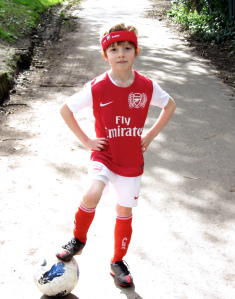I could see the penalty shoot out, but only just. Five balls in the back of the net and you win a prize! My two sons were standing in line, waiting, kicking up the dirt together in anticipation. It was the older one I couldn’t bear to watch. If I looked closely, I knew what I would find: determination etched into his face like warpaint. Desperation too. I would remember the times in the past he had crumpled under the inability to meet his own towering standards. I would get that queasy feeling in my gut, the one he of my four kids stirs up most regularly. This child, my first child, has never taken failure lightly.
And fail he did. Not a single shot in. At seven and a half, he was able to hold it together long enough to find me and stuff his face into my armpit before starting to cry. We walked away from the field slowly, closely, which somehow made getting to the heart of the matter easier. ‘I’m rubbish at football!’ he said, between sobs, a declaration but maybe in some small way a question. Could his mother, by the sheer power of her answer, make him better at something than he really was? ‘It was hard,’ I conceded, ‘the goalie was big.’ ‘Yeah, but Gabe scored twice.’ We are well past the age when they are oblivious to how their strengths and weaknesses stack up against their friends’.
‘Keep practicing,’ I offer, but the kid practices all the time. He’s out in the back garden after school kicking the ball around for hours, some nights I have to drag him inside flailing in protest. Effort is not the missing ingredient. Talent very well might be. ‘You’re not going to be good at everything,’ I say, and he hiccups a little though he’s heard these words before. It’s a standard line in our house, something I tell my kids almost as often as I cheer them on. And I cheer them on a lot.
The truth is that I don’t know how good Oliver is at football. Other things he does are more quantifiable to me. I know, for instance, at what level he reads. I know that when he was younger he was spectacularly bad at drawing. I know that he can sing sweetly and in tune and that he can’t run very fast for his age. I don’t know how good he is at football, but I can make an educated guess. I’d say he’s average.
The dreaded ‘a’ word. The ugly step-sister of that other ‘a’ word, the one thrown around in playgroups and parks with a frequency that belies its meaning: ‘advanced.’ Or if not advanced, then at least above average. It feels like every other child I know has been described to me as advanced or above average in some respect. Sure enough, a handful of them are. But the rest? The bell curve of life tells us they can’t be. The issue is not the kids, who are no doubt each uniquely wonderful (I mean that). It’s the moms and the dads and the stunning lack of objectivity that seems to go hand in hand with parenting these days.
We start out exaggerating wildly about them when they are tiny - ‘The cutest baby in the whole world!‘ - because we think the pitch of our language should match the ferocity of our love. Then they become toddlers and we see everywhere in their ordinary achievements signs of genius because we are bewitched by the magic of milestones. Finally they go to school where teachers and testing and teams reveal they aren’t as perfectly well-rounded as we imagined, but we continue to applaud them indiscriminately just the same. This time because we are convinced it is the way to re-boost their self-assurance. It’s an American phenomenon, this party of praise, says Christine Gross-Loh in Parenting Without Borders. It’s also a relatively recent one.
I wasn’t raised like that. If telling it like it is were an Olympic sport, my mom would medal in it. Her matter-of-factness didn’t always make me feel warm and gooey, but it did give me a realistic perspective on myself. It helped me to appreciate what I was actually good at. And it encouraged me to work damn hard at what I wasn’t. I never felt like my mom supported me any less in her candor: she was my biggest advocate. What I felt, rather, is that she saw me more for who I was and grounded me, as a result, in that vision.
Which is what I hope to do for my own children. Being honest with them about their deficits as well as their gifts is a choice, personal and deliberate. I can’t watch my kid miss five out of five penalty shots and think he did a ‘Great job!’. I won’t tell him he did, either. I don’t want him to expect success around every corner just because he turns it. What I want for him is to learn how to find enjoyment in the things he loves but doesn’t excel at. To grow as a person by striving for what doesn’t come naturally. Most of all what I want for him is to see himself clearly and to take pride in the picture nonetheless.
True confidence stems as much from self-awareness as it does from self-esteem.
This post is part of a ‘blogging carnival’ about cultural attitudes toward self-esteem and praise, inspired by the book Parenting Without Borders. Read the other participants’ thoughts at the links below:
- (School of Smock) “I Can’t Stop Praising My Kid!”: An Unfortunate Update
- (Mommy, For Real) Is Your Child in the Gifted Program?
- (Urban Moo Cow) Which Is More Important: Intelligence or Resilience?
- (Left Brain Buddha) Self-Esteem Isn’t Selfish
- (When Crazy Meets Exhaustion) Don’t Let Your Kid Become An Arrogant A-hole



